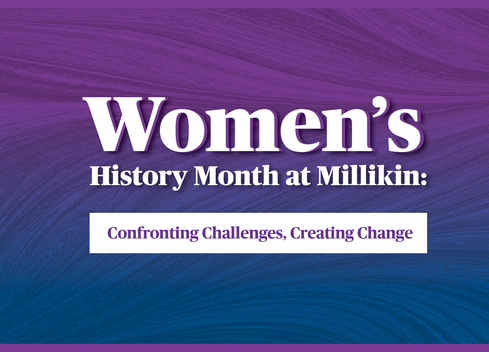Applied Statistics, B.S.

-
Students in the Applied Statistics program will master fundamental concepts and problem-solving skills, developing a deep understanding of foundational statistical theories, probabilityconcepts and mathematical modeling. The program prioritizes student proficiency in industry-standard statistical software and programming languages, including R, Python and SAS to process and analyze large-scale datasets effectively. Students will become skilled in creating clear and impactful data visualizations to effectively communicate findings to diverse audiences. The program also emphasizes ethical data practices, preparing students to adhere to ethical considerations surrounding data collection, privacy and interpretation, demonstrating a commitment to responsible and accountable data handling.
Beyond the foundational coursework in statistical theory and methodology, Millikin’s Applied Statistics program allows students to apply their analytical abilities to a diverse array of disciplines. Whether their interests lie in biology, finance, marketing, sports analytics, psychology, political science or other fields, Applied Statistics students are equipped with the skills necessary to interpret complex data and solve real-world problems. Millikin’s unique Performance Learning education provides students the technical expertise and critical thinking skills necessary for data-driven decision making in a rapidly evolving, technologically advanced world.
Applied Statistics majors graduate with the knowledge necessary to approach a wide range of problems across disciplines and industries, including data analytics, finance and risk management, technology and engineering, healthcare and biostatistics, government and policy, sports and entertainment, and education and research. Potential careers include:
- Data Analyst
- Data Scientist
- Business Intelligence Analyst
- Market Research Analyst
- Actuary
- Risk Analyst
- Machine Learning Engineer
- Biostatistician
- Government Policy Analyst
- Sports Analyst
- Gaming Data Analyst
- Academic Researcher
-
MA140 Calculus I (4)
Differential and integral calculus from the symbolic, graphical and numerical perspectives. Topics covered include concepts of limit, continuity, derivative and integral; applications of the derivative as rate of change; slope and solving max-min problems.
MA208 Discrete Mathematics (3)
Introduces basic techniques of proof and combinatorial problem solving. Topics include graphs, trees, logic, applied combinatorics and number theory.
OR
CS208 Discrete Mathematics for Computer Science (3)
Introduces essential discrete mathematics for computer science. Topics include sets, logic, functions, relations, sequences, matrices, discrete probability, graphs, applied number theory and algorithm analysis.
MA230 Regression Analysis and Time Series (3)
This course is an introduction to major methods of applied statistics and time series. Topics include simple and multiple regression, analysis of variance and covariance, model specification and residual analysis, nonparametric inference, experimental design and multivariate analysis. Introduces modeling time series data using smoothing techniques, regression and autoregressive models.
MA240 Calculus II (4)
Applications of definite integral and Fundamental Theorem of Calculus, methods of integration, power series, Taylor series, Fourier series and use of differential equations to model real-life applications.
MA303 Linear Algebra (3)
Matrices, linear systems, finite dimensional vector spaces, vector geometry, linear transformations and quadratic forms.
MA304 Probability (3)
Combinatorial analysis, probability axioms, discrete and continuous random variables and their distributions, central limit theorem and multivariate distributions. Prepares students for Exam P of the Society of Actuaries.
MA313 Numerical Analysis (3)
Iterative methods for approximating numerical solutions to systems of equations, polynomials, integral and differential equations. Includes matrix manipulation and error analysis.
MA314 Mathematical Statistics (3)
Point estimation, interval estimation, hypothesis testing and analysis of variance.
MA340 Calculus III (4)
Introduction to calculus of several variables, partial derivatives, multiple and iterated integrals, and vector functions.
MA414 Linear Models (3)
This course covers linear models and their applications. Topics include matrix algebra for statistics, multivariate normal distributions, distributions of quadratic forms, estimation and testing for the general linear model, and analysis of variance models.
MA499 Senior Seminar (3)
Research in mathematics. Students create and present a research project under the direction of a member of the mathematics faculty.
CS135 Introduction to Computer Science (3)
A first computer science course taken by students in mathematics and science, as well as those seeking the dual-degree program in computer science. Topics include fundamentals of computation and algorithmic problem-solving, data types, control structures, basic graphics, the object-oriented programming paradigm and applications. Introduces a high-level programming language such as Python.
CS235 Introduction to Data Science (3)
A continuation of CS135. Includes computational complexity, visual display of data, recursion, optimization, stochastic programming, Monte Carlo simulation, Bayesian inference, nearest neighbor classification and k-means clustering. Programs are implemented in a high-level programming language such as Python.
CS337 Algorithms and Data Structures (3)
Study of algorithms and data structures.
CS342 Artificial Intelligence (3)
Introduction to the theory and practice of artificial intelligence. Topic areas selected from heuristic search techniques, knowledge representation, symbolic reasoning, fuzzy logic, planning, learning, natural language processing, expert systems, genetic programming, intelligent agents, swarm intelligence and neural networks.
Two electives from the following:
CS308 Theory of Computation (3)
An introduction to the theory of computation emphasizing formal languages, automata and computability. Includes computational complexity and NPcompleteness.
CS360 Topics in Computer Science (3)
Elective topics in computer science. Examples include natural language processing, human-computer interaction, mobile computing, embedded computing, neural networks, cryptocurrency, game design, programming languages and cryptography.
MA305 Differential Equations (3)
Elementary differential equations and applications including linear differential equations with constant coefficients and first order systems, higher order differential equations and applications. Existence and uniqueness theorems. Numerical techniques.
MA324 Theory of Interest (3)
This course is designed to prepare students for Exam FM that is administered by the Society of Actuaries. Topics include compound interest formulas, annuities, perpetuities, amortization schedules, bonds and other securities.
IS370 Database Application Development (3)
Focuses on the database approach to information resource management and application development. Coverage of data modeling and tools for application development provided by database management systems. Project work using a full-featured database management system.
IS470 Business Intelligence and Big Data (3)
An in-depth study of various aspects of data collection, data extraction and knowledge discovery on the web for e-business intelligence and other massive databases. Data mining is the process of automatic discovery of patterns, changes, associations and anomalies in massive databases. This course will provide an introduction to the main topics in data mining and knowledge discovery. Emphasis will be placed on the algorithmic and systems issues, as well as application of mining in real-world problems.





